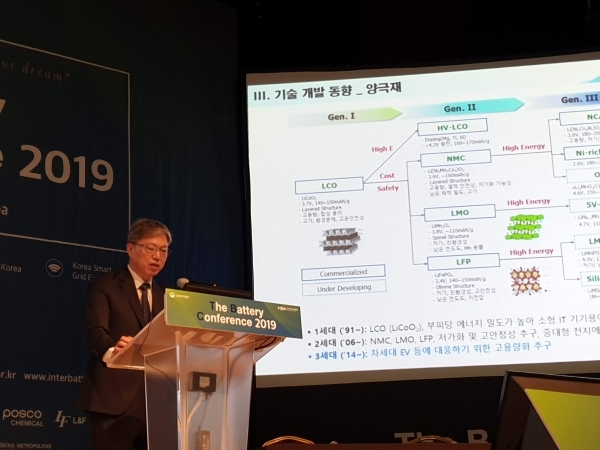
POSCO Chemical is planning to produce synthetic graphite cathode materials for the first time on South Korean soil from a plant it will begin building in Pohang in December this year, according to industry sources.
Until now, the country has relied entirely on imports for synthetic graphite cathode materials, with Cosco Chemical producing natural graphite.
Compared to nature graphite, synthetic graphite is considered as more capable of enhancing battery performance. Key producers are Hitachi and JFE of Japan, and China's Shanshan. Cathode is one of the four key materials for batteries, along with anode, separator and electrolyte. It generates electricity by releasing the lithium it had stored from the anode.
"So far, we had to rely on imports due to the lack of production facilities, but this will soon change,” said Kim Do-hyung, executive vice president of POSCO Chemical, in a keynote speech at the Battery Conference 2019 on Oct. 18.
The POSCO affiliate is also producing next-generation cathode materials using lithium metal, which makes batteries more stable and energy-efficient.
POSCO Chemical has been upping investment in battery material production facilities after merging its anode and cathode plants in April. The firm churns out an annual 15,000 tons of anode. When its Gwangyang plant is expanded next year, capacity most likely go up to 39,000 tons.
Up to 44,000 tons of natural graphite-based cathode material will be produced following the completion of its Sejong 2 plant next year. Depending on market conditions, POSCO Chemical believes it can produce up to 74,000 tons annually by 2021.
NCMA batteries
Battery capacity is gaining more and more attention as the electric vehicle (EV) market expected to grow at an annual average of 26% beginning next year. "This means we need batteries with energy density levels that are 50 to 100Wh/kg higher than now at around 300Wh/kg of energy," said Kim of POSCO Chemical.
Consequently, he expected a wider application of the NCM811 anode, which has nickel content up to 80% higher than the current NCM523. This would improve battery energy density by 20-30 percent to nearly double the driving distance from the current 400 kilometers by 2024.
However, higher nickel content usually cuts the battery life. Companies are deploying techniques such as anode coating and doping, but this is not enough. “One solution may be developing NCMA batteries that has the advantages of both NCM and NCA,” said Kim.
Unlike the conventional method of mixing only three metals, NCMA mixes four types of nickel, cobalt, manganese and aluminum. By adding aluminum to reduce the weight of cobalt, nickel content can go up to 90% while maintaining thermal stability.
The Elec is South Korea’s No.1 tech news platform.

